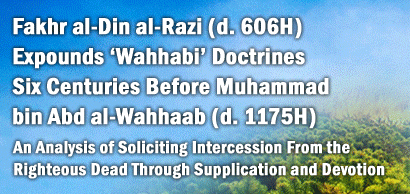| Sunday, 18 January 2026 |
|
|
|
You are here:
Home  General
General
 That which is spread by the dishonest contemporary Sufis is that Muhammad bin Abd al-Wahhaab (rahimahullaah) and those with him dismissed all previous scholarly heritage, reviled the forerunners, and scrapped their books, said it is prohibited to look at them, and made themselves the only scholarly authority. That is animal fodder purchased and consumed only by the dumbwitted, and is simply another piece in the propaganda jigsaw used to malign the monotheistic call of Muhammad bin Abd al-Wahhaab and those with him. We present here a short paragraph from Shaykh Abd Allah bin Muhammad bin Abd al-Wahhaab about the Shafi'i jurist Ahmad bin Hajar al-Haytami (d. 974H) [sometimes referred to as al-Haythami]. Before we come to the quote some very brief information about Ibn Hajar al-Haytami ought to be mentioned that will help to put it into context:
With this established, it is now interesting to see how al-Haytami is viewed by Shaykh Abd Allaah bin Muhammad bin Abd al-Wahhaab, and so we present here the statement which occurs in al-Durar al-Saniyyah (1/236):
ونحن كذلك : لا نقول بكفر من صحت ديانته، وشهر صلاحه، وعلم ورعه وزهده، وحسنت سيرته، وبلغ من نصحه الأمة ، ببذل نفسه لتدريس العلوم النافعة والتأليف فيها، وإن كان مخطئاً في هذه المسألة أو غيرها، كابن حجر الهيتمي، فإنا نعرف كلامه في الدر المنظم، ولا ننكر سمة علمه، ولهذا نعتني بكتبه، كشرح الأربعين، والزواجر وغيرها ؛ ونعتمد على نقله إذا نقل لأنه من جملة علماء المسلمين .
Comment
You can see here the respect that is given for Ibn Hajar al-Haytami's knowledge and understanding in certain areas (of Islamic sciences) alongside the fact that he was upon whatever he was upon, and contrary to the reprehensible lies of the Sufis, Ash'aris and others of today from whom you will be hard pressed to find even an ounce of academic honesty, the scholars of the da'wah to Tawhid did not make takfir of those scholars, but they made an excuse for them, and whilst considering them upon error, they said it was because (in the case of al-Haytami) he erred in the proper conception and understanding of this matter, meaning here, the Tawhid of the Messengers, in an era where there was already much confusion and departure from it. At the same time, when such scholars also have genuine knowledge and have works which are useful, then benefit can be gained from them. You can see the complete fairness and justice with which these Shaykhs of the da'wah of Tawhid treated past Scholars who might have had errors and opposition to the truth and its people, in fact even revilement of the people of the Sunnah, and how they treated their works. This is in stark contrast to the claims found in the propaganda of the Sufis. And the reason is fairly obvious, if the average person starts looking into the books of these Scholars first hand, they will see a picture entirely different to the fake one that has been created for this very purpose - to keep people away from learning the reality of the Tawhid that the Messengers came with.
Link to this article: Show: HTML Link • Full Link • Short Link
Related Articles: Add a Comment You must be registered and logged in to comment. |
|
||||||||||||||||
 |
 | |
|
|
 And we likewise, we do not not speak of the kufr of one whose religiosity is sound, whose rectitude, knowledge, piety, and abstinence has become well-known, whose conduct was good and [who] from his [intent of giving] advice reached the Ummah with self-sacrifice, to teach beneficial sciences, and authoring of (works) regarding them, even if he erred in this particular matter or others, such as
And we likewise, we do not not speak of the kufr of one whose religiosity is sound, whose rectitude, knowledge, piety, and abstinence has become well-known, whose conduct was good and [who] from his [intent of giving] advice reached the Ummah with self-sacrifice, to teach beneficial sciences, and authoring of (works) regarding them, even if he erred in this particular matter or others, such as 








